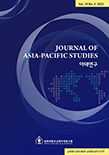한국사회의 연고주의 담론과 유교와의 무관련성 연구
Nepotism Discourse in Korean Society: It has nothing to do with Original Confucian Values
- 경희대학교 국제지역연구원
- 아태연구
- 제15권 제1호
-
2008.05105 - 124 (20 pages)
- 25

유교는 한국사회를 설명하는 데 여전히 유용한 틀이다. 최근 일부 학자들은 한국의 정치·경제·사회 현상을 설명하면서 유교의 역할을 언급하고 있다. 특히 몇몇 사회학자들은 현대 한국의 경제성장 요인을 분석하면서 핵심 동력으로서 유교적 인간관계를 언급하고, 그것을 연고주의로 풀어내어 이른바 거래비용을 줄이는 긍정적 역할을 한 것으로 설명하고 있다. 이러한 주장에 대하여 필자는 근래 한국사회의 연고주의가 원래 유교의 취지와 아무 관련이 없으며, 소위 유교민주주의니 유교자본주의니 하는 최근의 한국사회 담론들 또한 유가사상의 본질과는 관련이 없음을 밝히려 한다. 연고주의 담론이 왜 등장했으며 그것이 유교의 본질에 반하고 있다는 논지에서 출발하여, 한국 근대사회 연고주의 담론의 여러 문제와 병폐들을 지적하고, 유교는 원래 반연고주의를 본질로 함을 강조한 뒤 다음 두 가지로 결론을 이끌고자 한다. 첫째 한국사회 연고주의가 유교 전통에서 유래한 유용한 사회자본으로서 경제발전에 도움이 된다는 인식이 불철저한 유교인식에서 비롯되고 있음을 지적하고, 시민사회의 발전이 바른 길임을 천명하고자 한다. 둘째 [연고주의 ← 가족주의 ←유교]라는 도식으로 유교가 연고주의의 원산지라고 설명하는 방식이 근거가 없음을 밝히고, 거기서 나아가 연고주의가 전통 유가사상에 배치되며, 유가사상의 현대화는 연고주의 탈피를 통해 이루어질 수 있음을 주장하고자 한다.
Confucianism has been receiving a great deal of attention in Korean Society. Recently some scholars in fields such as Asian Studies, Political Economy and Sociology have emphasized that Confucianism can be attributed to core factors including the rapid economic development of Korea. Some Sociologists wish to call your particular attention to Korean network society as an affectional relationship. They think the 'network-oriented' nature of Korean society came from traditional Confucianism, and can understand it as a form of reducing 'transaction cost' for the entire Korean society, and steer industrialized Korea to prosperity. Some people say that conceptualized 'Confucian Democracy' or 'Confucian Capitalism'. It proved to be true? We know that Korean traditional society is very different from the West where society is ordered around individual values, but have a rich contents of community. Confucian values will be more esteemed and treasured by people as they became harder maintain, as it becomes impossible economically to practice those virtues. Confucianism not be connected with Capitalism. Network is extremely important for Human beings(not only Korean) because it is through building and maintaining ties that they order their world and pursue their goals. It is also an important means to build trust. As we all know, filial piety, discipline, work ethic, and meritocracy are not only traditional Confucian values, but also can be found in other cultures, they were shared and practiced in the U.S. during the forties and fifties, for example. To be sure, their opinion had the effect of booting public`s awareness of Confucianism. However, their overemphasize came to the detriment of serious and balanced inquiry into the history, logic, and ideals of this traditional Confucianism. There is not an indissoluble connection between traditional Confucianism and Korean discourse of nepotism or the network society. I would like to emphasize that the task of modernizing traditional Confucian values need not lead to conservative conclusions, and need to develop normative arguments which would explain why certain values should continue to remain influential and why others should not.
Ⅰ. 서론
Ⅱ. 연고주의 개념과 현대 한국의 연고주의 담론
Ⅲ. 한국 근대화과정 중 나타난 연고주의의 반유교성
Ⅳ. 유교의 반(反) 연고주의 전통
Ⅴ. 결론
참고문헌
(0)
(0)